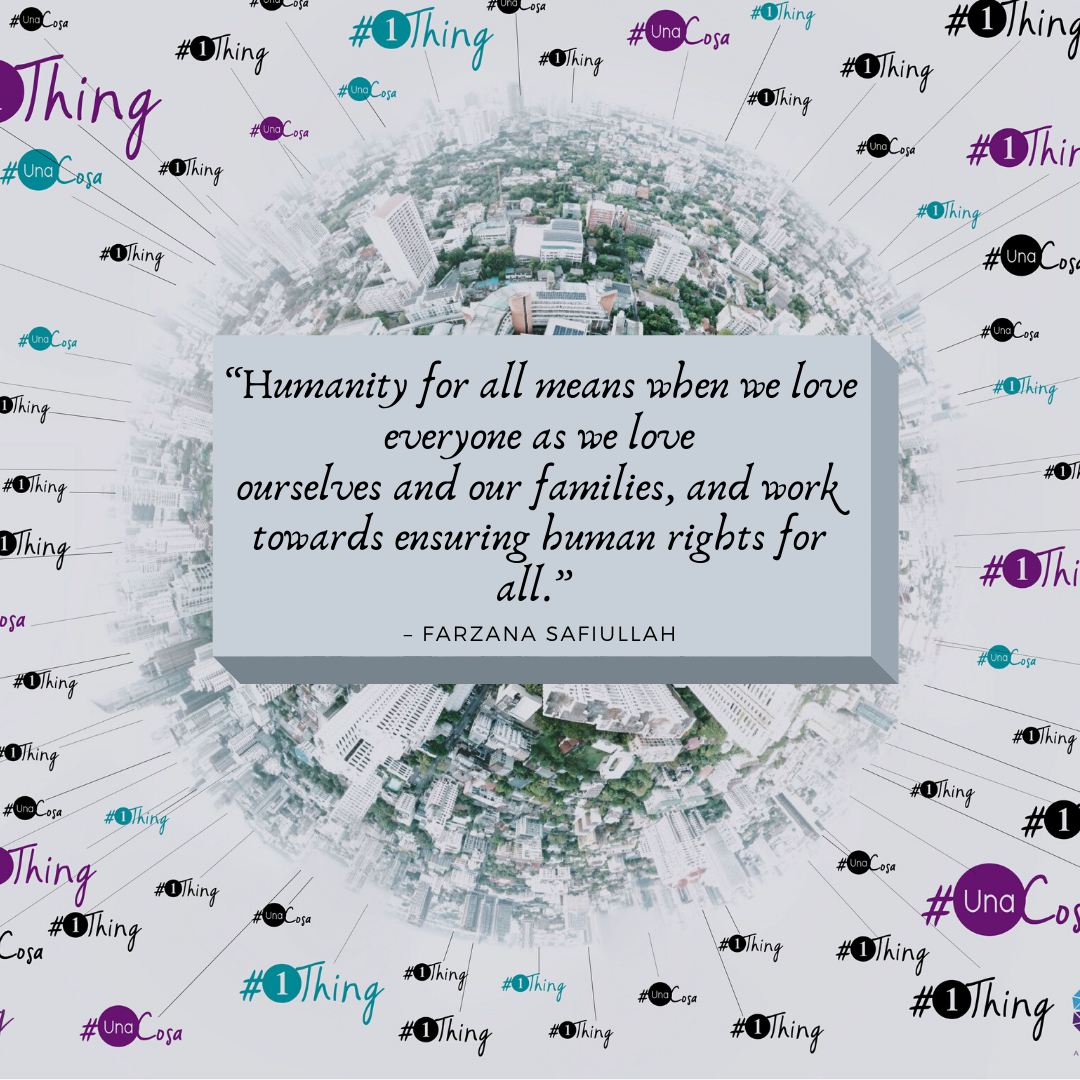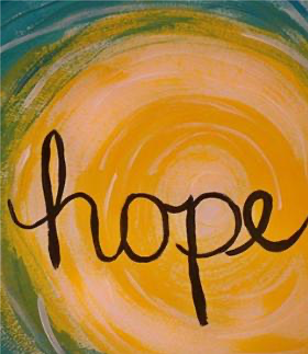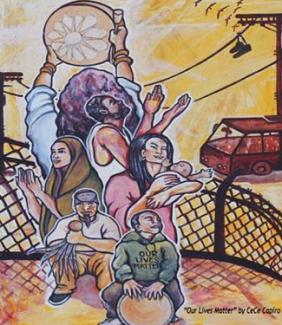By Arlene Vassell, Vice President of Programs, Prevention and Social Change
Despite the fear, despair, paranoia and uncertainty our communities are experiencing, there is also an abundance of connectedness, support, courage, hope and gratitude.
“Thriving, healing and hurting can all happen simultaneously.” – Arlene Vassell
And while the scope and impact of the coronavirus disease (COVID-19) has been unprecedented, so has been the outpouring of community care, deep concern about the varying adverse impacts on our loved ones, communities, nation and globe and efforts to take tangible action to support each other’s well-being. At this moment in time, each of us is experiencing both the rapid spread of COVID-19 and the systemic response to it, which has exposed structural injustice and inequity in new and profound ways.
 This moment. COVID-19. The global pandemic that calls upon us to reexamine policies and practices that reinforce racism and patriarchy and consider how we boldly pivot “our” work moving forward. Along with the health impact of this global pandemic, xenophobia has increased at astronomical rates, low wage workers have been disproportionately impacted by the economic catastrophe and the sudden shift to virtual learning spaces has diminished the opportunity for equal engagement for poor children and youth of color. How do we support survivors and advocates, create brave spaces and thriving communities, and dismantle biased systems? Advocates and preventionists continue to share stories of uncertainty, as they grapple with this question and ponder the new we. A question that illuminates possible conflicts with current practices, personal values and the realities that exist in marginalized communities across the nation. This moment in time calls upon us to purposefully restore humanity for all. When we work together, care for ourselves and each other, and stay connected to the core values that guide us, social transformation is possible.
This moment. COVID-19. The global pandemic that calls upon us to reexamine policies and practices that reinforce racism and patriarchy and consider how we boldly pivot “our” work moving forward. Along with the health impact of this global pandemic, xenophobia has increased at astronomical rates, low wage workers have been disproportionately impacted by the economic catastrophe and the sudden shift to virtual learning spaces has diminished the opportunity for equal engagement for poor children and youth of color. How do we support survivors and advocates, create brave spaces and thriving communities, and dismantle biased systems? Advocates and preventionists continue to share stories of uncertainty, as they grapple with this question and ponder the new we. A question that illuminates possible conflicts with current practices, personal values and the realities that exist in marginalized communities across the nation. This moment in time calls upon us to purposefully restore humanity for all. When we work together, care for ourselves and each other, and stay connected to the core values that guide us, social transformation is possible.
To begin the journey of healing, hope, restoration and meaningful connection in our communities, NRCDV offers a compilation of resources that respond to themes that have emerged from recent COVID-19 technical assistance requests and conversations with advocates and preventionists. See also NRCDV’s original package of resources on Preventing & Managing the Spread of COVID-19 Within Domestic Violence Programs.
“The separation between work and personal life reenergizes us, but when your work comes home with you, we can be more susceptible to burnout. It is important for advocates to prioritize their wellbeing and set boundaries on their work schedule in order to keep going during this crisis.” – Ivonne Ortiz
What does gender-based violence prevention look like in the face of COVID-19?
At its core, prevention work is about fostering thriving individuals, families, and communities, which makes addressing the impact of COVID-19 imperative at this challenging and uncertain time. Successful prevention efforts reflect a social change model that explores the root causes of violence and oppression and promotes a thriving culture where all relationships are built on respect, equality and peace.
At this moment in time we are seeing the work that must be done to promote 1) health equity, 2) racial justice, and 3) community care as sustainable remedies to foster healthy and thriving communities. Prevention is social change work.
 How can we be messengers of hope when our communities continue to experience uncertainty and chaos?
How can we be messengers of hope when our communities continue to experience uncertainty and chaos?
“It has been said that a person can live about 40 days without food, about three days without water, about eight minutes without air, but only for one second without hope. Many people believe that when you lose hope, you lose everything. For victim advocates, hope has a unique look and feel. For some, hope can be the lifeline to surviving one more night or the fuel to continue the work to eradicate gender-based violence. The hope of making a difference in a survivor’s life is the only thing that keeps them working towards creating social change. You see, without hope, it is really hard to envision a world without violence. The human heart is fueled by hope. It is what keeps a lot of us going each day.” My community is going through difficult times: how can I be a messenger of hope? (Ivonne Ortiz)
How can we generate financial support to respond to the urgent needs of survivors and their families in the face of COVID-19?
The National Resource Center on Domestic Violence (NRCDV) recognizes that while advocates are working selflessly and tirelessly to continue life-saving services through the COVID-19 pandemic, they are also worried about the impact on their already tight budgets. The reality is, as the devastating economic impact of COVID-19 unfolds, domestic violence programs will need significant support from their community to adequately respond to the unique needs of each survivor and their families.
To assist with those efforts, NRCDV has developed a #1Thing fundraising digital campaign that local programs can utilize and adapt to invite community support at this critical time.
Sample Social Media Posts
Facebook:
- We are working around the clock to provide life-sustaining services in your community and we need your help! Your donation will help offset increased shelter expenses due to COVID-19. #1Thing you can do to help is to give today! https://dvawareness.org/fundraising-COVID-19
- ➡️ $25 = Cleaning and sanitation supplies to keep shelter residents and staff safe and healthy.
- ➡️ $65 = One night safe and free from worry in our emergency shelter.
- ➡️ $125 = 24/7 crisis line services with a trained advocate.
- ➡️ $500 = Fresh groceries for families living in our shelter.
- ➡️ $1,000 = Technology and school supplies that will equip the children living in a shelter to succeed in online learning.
Twitter:
- We’re working around the clock to provide life-sustaining services for domestic violence survivors. 💸$25 = Cleaning + sanitation supplies to keep shelter residents + staff safe + healthy. Can you do #1Thing to help us keep our doors open (+ clean!)? https://dvawareness.org/fundraising-COVID-19
Instagram:
- Isolation hurts survivors of domestic violence and their children, but our programs are here to support survivors and their families. Our program is playing a critical role in ensuring the safety and security of our community, but we need your help! The need for financial support is immediate - take action and give through our website today! 💵
#1thing #COVID19 #coronavirus #fundraising #donate #DomesticViolence #BelieveSurvivors #ForACause #BeTheChange #DoGood
Visit Fundraising Strategies for Local DV Programs in Response to COVID-19 for the full compilation of social media posts.
Help! How can we support students, educators, preventionists, parents and caregivers with staying connected during this time when schools have closed and/or shifted to virtual learning environments?
Preventionists, advocates, parents/caregivers, and educators alike are exploring new and creative ways to engage students in continued education and development during this time when schools have closed and/or shifted to virtual learning environments. While the reality of the digital divide limits the opportunity for equal engagement, there are several interactive online tools available to engage students at various levels who do have access. These online resources for virtual learning and connection can be utilized by preventionists, educators and caregivers to promote the continuity of school-based prevention efforts, foster family resilience, support the development of healthy relationships and help build students’ understanding and capacity to promote justice, equity, and connectedness on a larger scale.
COVID-19. Learn how students in affected countries keep learning and staying positive during this time of uncertainty. #VoicesofYouth
How can the domestic violence movement incorporate and center racial equity in self-care practices?
“It’s a great gift that balance, healthy lifestyles, and stress management are becoming common imperatives, rather than written off as selfish, unnecessary, or unproductive. But, does everyone have equal access to the tenets and practices of self-care? And, is the way we define self-care inclusive of all people – those with diverse backgrounds, experiences, and identities? Who gets to practice self-care?” – Rex Leonowicz from 3 Things You Should Know About Intersectionality and Self-Care
Be mindful of organizational policies and practices that fail to center physical and emotional wellness for all, especially front-line staff, working long hours and living paycheck to paycheck.
“Front-line advocates are extending themselves and, in many cases, putting themselves at risk to support the safety and well-being of survivors and their children in the face of COVID-19. Now is the time to show them that we see them, value them, and support them.” – Casey Keene
Advocacy during COVID-19 is difficult. #Care4Advocates
Self-care is so much more than candles, bubble baths, chocolate and roses. It’s being able to freely connect with the things, people and places that give you joy. It’s having the ability to prioritize ones’ emotional, mental, physical and spiritual well-being. Self-care is best achieved in a supportive environment that allows individuals to bring their whole selves into the space. All individuals. All identities. All lived experiences. Self-care is about showing up for yourself and others. Self-care is self-preservation. Self-care is not optional for black and brown survivors, advocates and preventionists; it is necessary for survival in oppressive systems.
NRCDV STANDS with advocates and preventionists working to build the beloved community envisioned by Dr. King. The core values of Dr. King’s vision embody love, trust, equity, respect, freedom, safety and justice for all. NRCDV’s work is grounded in the belief that “injustice anywhere is a threat for justice everywhere” (Dr. Martin Luther King, Jr.). We know that our collective liberation is intricately connected to each other, and we must work together to create the world we would like to see.
At this moment. COVID-19. This public health pandemic calls upon all of us to address the root causes of violence and oppression and center the lived experiences of survivors of color in order to end systemic racism and attain safe and thriving communities. Awareness + Action = Social Change.
NRCDV will continue to share resources and guidance to support survivors, advocates and preventionists on our journey to restore humanity for all.
Main image source: Checking in With Our Humanity.














